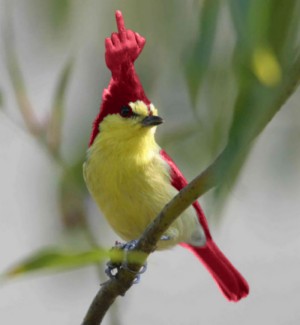User:ThruthinessBee/Offensive Tit
The Offensive Tit (Titmouse) is a genetically engineered bird indigenous to Southeast Asia. It was developed by the Middle-aged Mutant Ninja Tortoises (MMNT) specifically to harass U.S. forces in the area. Belonging to the family Paridae, it is a truly revolting creature and is aptly named. As its distinctive head crest suggests, it has a nasty disposition and is very hostile. Like most members of the Paridae family it is a plump songbird, but its call is astonishingly irritating and has been reported to have caused cancer in laboratory mice. Its excreta is uncommonly foul-smelling, with a pungent and persistent aroma. It is also known as the Phu Bird, or sometimes the Milermore.
Wartime service[edit | edit source]
All birds have a tendency to leave droppings on or near people, but the Phu Bird excels in hitting U.S. ground forces with phenomenal accuracy and precision. If one receives such a gift, it must not be washed off for one week, or seven days, whichever occurs first. Legend has it that a PFC could not tolerate the smell, and bathed in the Mekong river after only two days. He was hit and killed by a water skier before he could reach the riverbank, thus giving rise to the adage "If the Phu shits, wear it!"
Breeding habits[edit | edit source]
The MMNT were concerned that if the Offensive Tit population grew too large, the birds might begin attacking Vietnamese. They had seen "Jurassic Park" and knew that making all the birds female would not prevent offspring, so they made the Milermores homosexual instead. During mating, the birds insert their beak into their partner's cloaca (birds don't have an anus) and blow, making a tremendously loud sound that can be heard for a Milermore.
Offensive Tits nest on the ground in shaded areas, often under ferns. Three or four eggs are laid over a two day period. The eggs are inedible, but the nests are highly prized by the Chinese for making soup. The Vietnamese say the Chinese will eat anything. Nests are harvested in late spring after they have been abandoned, to avoid contact with the dirty birds. Export of Phu Bird nests accounts for a good portion of the Annual Domestic Product of Vietnam.

